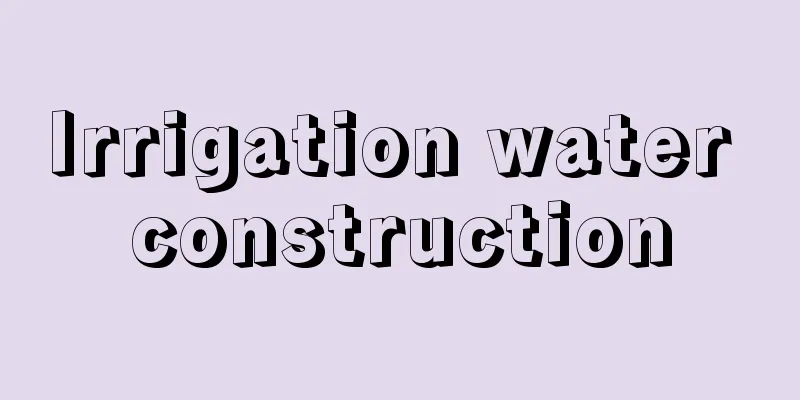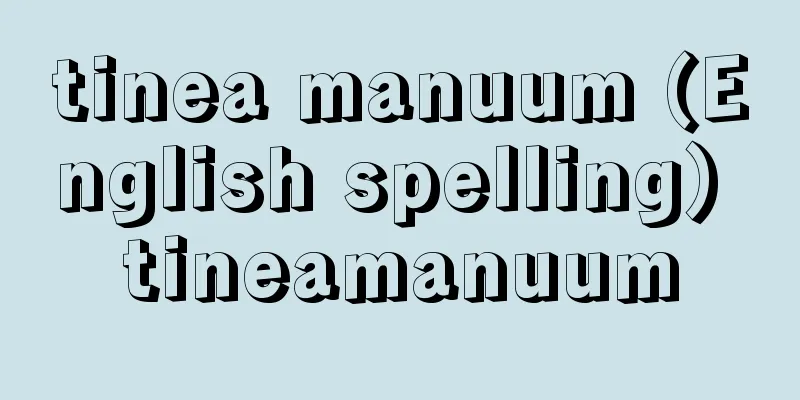Irrigation water construction

|
...In particular, in the case of construction of river diversions, irrigation canals, road bridges, etc., construction carried out at the expense of the surrounding villages was called self-construction, whereas construction carried out at the expense of the feudal lord was called self-construction. The management of rivers and canals in the Shogunate's territory was originally the responsibility of the magistrates, and in a proclamation issued to the head of the accounting group and the magistrates in 1687 (Jokyo 4), it was stipulated that construction of irrigation canals should be carried out by the peasants themselves, with up to 50 laborers on a salary of 100 koku, and that laborers' allowances should be paid when the number exceeded this number, that construction of river diversions should be paid with rice allowances regardless of the number of laborers, that gold and silver should be provided for all construction, that bamboo, kaya, straw ropes, etc. should be provided if they were within the jurisdiction, and that if they were not, payment should be made for them, and that construction of bridges along highways, regardless of their length, should be paid for by the Shogunate, and that in the case of villages, they should be paid for as a general rule. The increasing cost of construction work became a problem due to the deterioration of the shogunate's financial situation, and in 1713 (the 3rd year of Shotoku), an order was issued to prohibit townspeople from contracting out construction work and to have peasants carry out construction themselves as much as possible. *Some of the terminology used in relation to "irrigation water construction" is listed below. Source | Heibonsha World Encyclopedia 2nd Edition | Information |
|
…とくに堤川除(かわよけ)・用水・道橋等の普請において,周辺村落が費用を出して行った工事を自普請というのに対し,領主側が費用を負担して行った工事をいう。幕領における河川・用水等の管理は元来代官の任務で,1687年(貞享4)の勘定組頭・代官への布達に,灌漑用水普請は高100石に人足50人まで百姓自普請で行うこと,この人数を超えるときには人足扶持を支給すること,堤川除普請は人数の多少にかかわらず扶持米を支給すること,また金銀入用はいずれの普請についても支給すること,竹木・カヤ・わら縄等は支配所内にあればこれを与え,ない所は代金を支給すること等と規定され,橋普請は街道筋の場合,長短に限らず幕府が出費し,在郷の場合は原則として所役とすることとされた。こののち増大した御普請費用は幕府の財政状態の悪化により問題化し,1713年(正徳3)には町人等の請負工事を禁じて,なるべく百姓自普請で行うことを令した。… ※「灌漑用水普請」について言及している用語解説の一部を掲載しています。 出典|株式会社平凡社世界大百科事典 第2版について | 情報 |
<<: Irrigation pond - Irrigation pond
>>: Irrigation water - irrigation water
Recommend
Sinobambusa tootsik (English spelling)
...Rikuchudake ( S. kagamiana Makino) is the most...
Ili [river] - Ili
A river that flows through both China and Kazakhst...
Faience (English spelling)
(1) Tin-glazed soft earthenware. A term derived fr...
Multiple sclerosis
Concept Multiple sclerosis is the most common demy...
Nachi stone
The name of a black, dense siliceous slate found i...
Project Mercury
America's first manned space flight program. S...
Tatsuruhama [town] - Tatsuruhama
An old town in Kashima County facing Nanao Bay in ...
Sumiyoshi Shrine
A shrine whose main deity is the God of Sumiyoshi....
Yabe [village] - Yabe
A village in Yame County at the southern tip of Fu...
Door engine
An automatic vehicle door opening and closing devi...
Wet and dry bulb hygrometer (English spelling)
An instrument that measures the humidity of the at...
culture pattern
…The basic cultural regions on Earth today are Eu...
Munetake Tayasu
Year of death: 4th June 1771 (15th July 1771) Year...
Takahashi Shell Mound
A shell mound from the Early Yayoi period in Takah...
Husband and wife - Husband and wife
The word fuufu, along with "meoto," is ...









